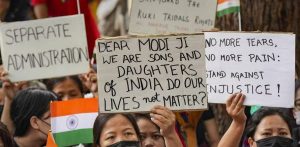


The ongoing conflict between Kuki militants and security agencies in Manipur has taken a dangerous turn as the Kukis have sought foreign help in their demand for a separate state. According to sources, the World Kuki-Zo Intellectual Council has approached the UN, UK and Israel with their demands, citing their right to self governance under the Indian Constitution and various international agreements. The Kukis claim to be lost Jew tribes who were brought to India for tourism but later held captive by the country.
The Kuki Conflict in Manipur: Seeking Foreign Aid for Statehood
The ongoing conflict between Kuki militants and security agencies in Manipur, India, has taken a new and dangerous turn. The Kukis, an ethnic group native to the region, have sought foreign assistance in their demand for a separate state.
Background of the Conflict
The Kuki conflict in Manipur has its roots in historical grievances and political aspirations. The Kukis claim to have been brought to India centuries ago as a "lost" Jewish tribe and forcibly converted to Christianity. They allege discrimination and marginalization by the dominant Meitei ethnic group in Manipur.
Over the years, Kuki militants have formed various groups, demanding autonomy or statehood for the Kuki-inhabited regions of Manipur. These groups have been involved in armed conflict with Indian security forces, leading to violence and instability in the region.
Seeking Foreign Help
In a significant development, the World Kuki-Zo Intellectual Council (WZIC), a Kuki representative body, has reached out to the United Nations (UN), the United Kingdom (UK), and Israel, seeking their support for their demand for a separate Kuki state.
The WZIC argues that the Kukis have the right to self-determination under the Indian Constitution and various international agreements. They claim that they have been denied their rights and have faced systematic oppression by the Indian government.
Top 5 FAQs and Answers
1. Who are the Kukis?
The Kukis are an ethnic group native to the Indian state of Manipur. They are part of the larger Zo ethnic family and have distinct cultural practices and traditions.
2. What is the basis for their demand for a separate state?
The Kukis claim historical grievances and political aspirations as the basis for their demand for a separate state. They allege discrimination by the dominant Meitei ethnic group and denial of their rights by the Indian government.
3. What is the World Kuki-Zo Intellectual Council (WZIC)?
The WZIC is a Kuki representative body that has been advocating for Kuki rights and interests. It has reached out to international organizations seeking support for their demand for a separate state.
4. Have the Kukis received any foreign assistance in the past?
There have been reports of past foreign support for Kuki militant groups, but such assistance has been denied by the government. However, the WZIC's outreach to international organizations represents a new level of foreign engagement in the conflict.
5. What are the potential implications of foreign involvement in the Kuki conflict?
Foreign involvement could further complicate the conflict and make it more difficult to find a peaceful resolution. It could also lead to increased violence and instability in the region, potentially destabilizing India's Northeast.

In honor of World Polio Day, local restaurants in Minnesota are teaming up for the "End Polio Now" event to raise awareness and funds for polio eradication. From 7 a.m. to 7 p.m., residents are encouraged to dine at participating restaurants where volunteers will educate them on the impact of polio worldwide and how to help. The event's signature sponsor, Eagle Rock, along with other local restaurants, will donate proceeds to Rotary International, which uses funds to provide polio vaccines to children in vulnerable areas. This effort is crucial given that polio continues to be a problem in some parts of the world, even though it has been eliminated in the US since 1979.

In a tightly contested race for the Rajya Sabha seats in Jammu & Kashmir, the ruling NC alliance emerged victorious, securing three out of the four seats. The BJP, which held only 28 seats in the Assembly, had hoped for a win through cross-voting or support from smaller groups. However, the NC's dominant position in the 88-member Assembly reaffirmed voter trust in their post-Article 370 political stability. PDP President Mehbooba Mufti also congratulated the NC candidates and expressed hope that they will strongly represent the people of Jammu & Kashmir in Parliament.

Mayor Derek Slaughter has vetoed a recent city ordinance that limits the terms of elected officials, citing concerns about retroactivity and lack of language addressing current officials. This veto comes after the ordinance was adopted in a 6-0 vote by City Council, with the mayor absent. If legally challenged, the defense of this ordinance could result in unnecessary costs for taxpayers. The mayor's decision has sparked a response from council members, with attempts to reach them for comment.

Prime Minister Narendra Modi addressed his first election rally in Bihar and expressed confidence in winning the upcoming polls. He mocked the opposition INDIA bloc and praised the unity within NDA, highlighting leaders like Nitish Kumar, Chirag Paswan, Jitan Ram Manjhi, and Upendra Kushwaha. Modi also criticized the 'jungle raj' under RJD and Congress and highlighted Bihar's progress under Nitish Kumar's tenure. Despite the upcoming Chhath festival, the PM thanked the crowd for attending and described the recent GST rate revision as a 'festival of savings'.

The suspension of Praveen Kumar K P, a PDO serving in Sirwar taluk of Raichur district, for participating in an RSS rally has sparked controversy in Karnataka. BJP leaders have condemned the move and promised to fight it legally, claiming that the officer's right to participate in such events is protected by law. Meanwhile, the state's Rural Development Minister has written to the Chief Minister for a ban on RSS activities on government premises, further intensifying the issue.

In a heated verbal exchange, Maratha quota activist Manoj Jarange Patil accused NCP Minister Chhagan Bhujbal of attempting to create a rift between the OBC and Maratha communities for political gain. During a recent OBC rally in Beed, Bhujbal and Dhananjay Munde attacked Jarange, with Pankaja Munde, a BJP OBC leader, watching from the sidelines. Jarange also praised Chief Minister Devendra Fadnavis and Minister Pankaja Munde for staying away from the rally and emphasized the unity of the OBC community. Bhujbal, on the other hand, warned Jarange against challenging the community's rights and vowed to stand up against any attempts to divide them.

On the auspicious occasion of Bhai Dooj, Madhya Pradesh Chief Minister Mohan Yadav transferred a total of 44,900 crore directly into the bank accounts of 1.27 crore women beneficiaries under the Ladli Bahna Yojana. This initiative aims to support and empower women in the state, with each eligible woman set to receive 1,500 per month from November onwards. During the special program at the Chief Minister's residence, Yadav extended his wishes for a happy Bhai Dooj, emphasizing the importance of the brother-sister relationship and the government's commitment towards ensuring the safety and well-being of Ladli Bahnas in the state.

Union Home Minister Amit Shah celebrated the Gujarati New Year and his 62nd birthday in his hometown of Ahmedabad, surrounded by senior political leaders, party members, and well-wishers. Shah's rise in public life through the RSS and his partnership with Prime Minister Narendra Modi have shaped Gujarat's and India's political narrative. His sharp organisational mind, efficient approach, and booth-level political management have been key in building the "Gujarat model" that gave the BJP an enduring edge. Despite transitioning to national politics, Shah's political heart still beats in Ahmedabad, as evident in his New Year celebrations and plans to meet the newly appointed ministers of the Gujarat cabinet.

In a recent incident at the Vasai Fort in Maharashtra, a man dressed as Chhatrapati Shivaji Maharaj got into a heated argument with a security guard over language. The man, who was recording a video, berated the guard for not speaking Marathi and disrespecting the legacy of Shivaji Maharaj. Social media users were divided in their opinions, with some criticizing the man's behavior while others felt the guard needed to be taught a lesson.

In a significant moment for gender equality, President Droupadi Murmu became the first woman to visit the Lord Ayyappa Temple in Sabarimala. Accompanied by her team, she performed Darshan and Puja at the shrine, praying for the well-being and prosperity of her fellow citizens. Her visit symbolized the Supreme Court's decision to lift the ban on menstruating women entering the temple, reminding us that devotion knows no gender barriers.